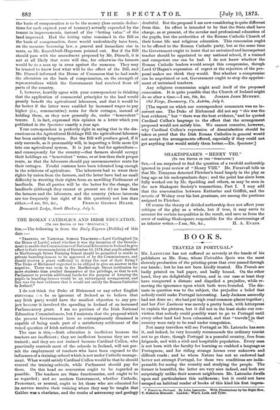THE AGRICULTURAL HOLDINGS BILL AND THE LABOURERS.
[TO THE EDITOR OF THE " SPECTATOR.1
Sra,—Your correspondent "A. K. C." seems to have overlooked the important alteration in the Agricultural Holdings Bill whereby the basis of compensation is to be the money (less certain deduc- tions for each expired year of tenancy) actually expended by the tenant in improvements, instead of the "letting value" of the land improved. Had the letting value remained in the Bill as the basis of compensation, there would undoubtedly have been, on the measure becoming law, a general and immediate rise in rents, as Mr. Knatchbull-Hugessen pointed out. But if the Bill should pass with the amendment proposed by Mr. Disraeli, it is not at all likely that rents will rise, for otherwise the farmers would be to a man up in arms against the measure. They may be trusted to know best what will be the effect of the Bill, and Mr. Disraeli informed the House of Commons that he had made the alteration on the basis of compensation, on the strength of representations which the Government had received from all parts of the country.
I, however, heartily agree with your correspondent in thinking that the application of commercial principles to the land would greatly benefit the agricultural labourers, and that it would be far better if the latter were enabled by increased wages to pay higher (i.e., remunerative) rents for their cottages, instead of holding them, as they now generally do, under "benevolent" tenure. I, in fact, expressed this opinion in a letter which you published in the Spectator exactly a year ago.
Your correspondent is perfectly right in saying that in the dis- cussions on the Agricultural Holdings Bill the agricultural labourer has been entirely forgotten. But the Bill will produce good, if it only succeeds, as it presumably will, in importing a little more life into our agricultural system. It is just as bad for agriculture— and consequently for the country—that farmers should occupy their holdings on "benevolent " terms, or at less than their proper rents, as that the labourers should pay unremunerative rents for their cottages. Feudal customs have been tolerated long enough in the relations of agriculture. The labourers had to wrest their rights by union from the farmers, and the latter have had no small difficulty in wresting their rights from an unwilling Parliament of landlords. But all parties will be the better for the change, the landlords (although they cannot at present see it) no less than the farmers and the labourers, and the country (whose interests are too frequently lost sight of in this question) not less than



































 Previous page
Previous page